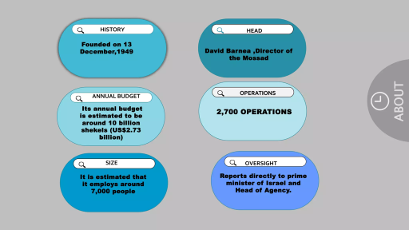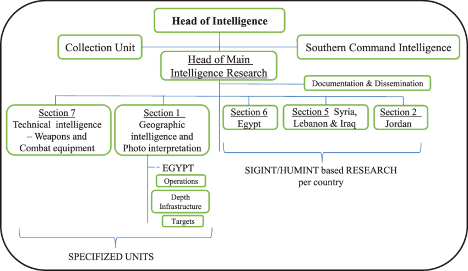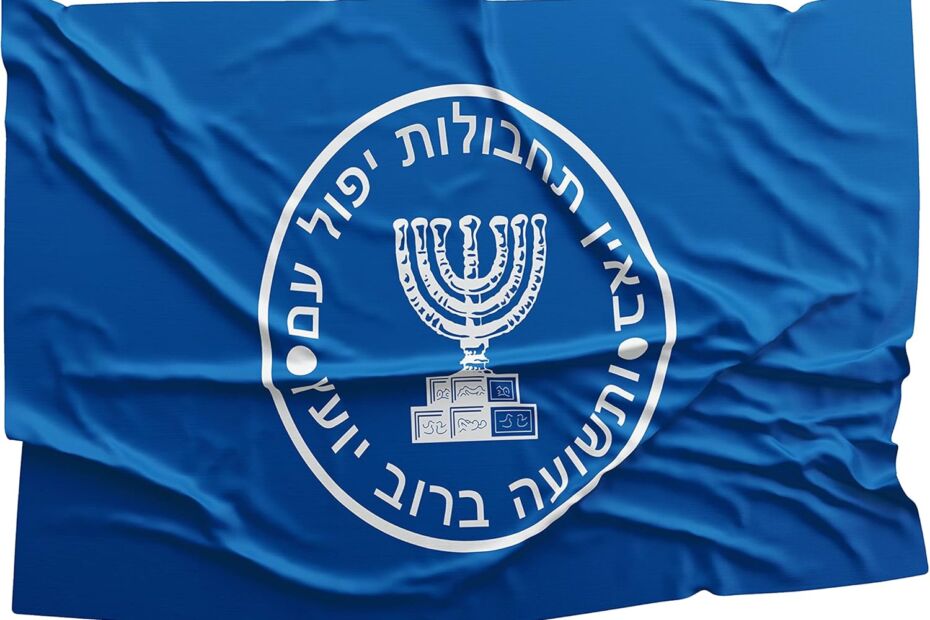Intelligence plays a major role in Israeli national security and is often described as Israel’s ‘first line of defence’. In 2018, ‘intelligence superiority’ was mentioned as a major component of the Israel Defence Force (IDF) strategy according to Shapira and Siman-Tov who have collaborated on intelligence-related publications specifically about Israeli, Hamas and Hezbollah intelligence. Importantly, intelligence has a crucial role in implementing Israel’s national security doctrine relying on the four pillars: early warning, deterrence, battlefield decision, and defence (the latter added circa 2006).
HISTORY, LEGISLATION AND OVERSIGHT
Following the British departure from Palestine and the birth of Israel in May 1948, three intelligence agencies emerged. AMAN, in charge of military intelligence, Mossad, in charge of foreign intelligence gathering, intelligence analysis and covert operations, reporting to the Prime Minister and Shin Bet. Mossad’s official website refers to the establishment of the Institute for Intelligence and Special Operations (Mossad) in July 1949. This took place soon after the foundation of the State of Israel when Prime Minister David Ben Gurion recognized the need for a national framework of intelligence bodies. As is customary worldwide, the decision was to set up three separate frameworks: A military intelligence service, later Israel Defence Intelligence (IDI), an internal security service (later ISA/Shin Bet/Shabak ), and an Intelligence Service operating abroad, which later became Mossad.
The establishment of Mossad was incremental and replaced the Haganah Information Service which was discontinued on June 30th, 1948
In 1952, Reuven Shiloah completed his term as Mossad Director, and was replaced by Isser Harel, who was previously head of Shin Bet, and was now placed in charge of both organizations. Harel served as Mossad Director until 1963. During his term, Mossad grew from about 80 employees to over 620, expanded its activity, and performed a variety of intelligence collection and special operations tasks.
“The Mossad’s legal basis is derived from the Basic Law on the Government which outlines the Government’s authority to engage in various activities including those related to national security and intelligence. As the Mossad operates under the purview of the Government, its actions are likely governed by this legal framework. However, the specific details of how the Mossad operates within this framework are highly classified. The exact legal provisions that govern its activities are not publicly available”. According to Ze’ev Segal, writing a piece titled “A Legal Framework for the Mossad,” in Haaretz, it is apparent Israel’s Prime Minister alone approves the special operations of the Mossad. If true, it is the only government agency whose operations are subject to the decisions of only one individual. This is stated in some official sources, however, there is no clear information to confirm it.
The Knesset is the single-chamber legislating body of Israel which serves as the nation’s supreme state body. There is limited information about the Knesset visible in the public domain, however, Barucija observes that Mossad is overseen by the Knesset Foreign Affairs and Defence Committee and the Subcommittee for the Intelligence Services.
According to Israeli investigative journalist Ronen Bergman, the approval of the Prime Minister of Israel is required for Mossad’s operations including assassinations. Bergman observes that Israeli prime ministers typically prefer not to make a unilateral decision for political reasons and often include other ministers such as the minister of defence. Once the approval is obtained, the operation then reverts to Mossad for planning and execution. This could take weeks, months or even years, depending on the target
Figure 1 illustrates some key Mossad facts.

Figure 1. KeyMossad facts. Image Source Credit: https://www.slideshare.net/NickStachowiak/the-israeli-intelligence-community-presentation-142257133
IDEOLOGY AND AIMS
Ideologically Mossad has demonstrated a capacity to be proactive and to seek retribution by planning and executing strikes against its adversaries. At the outset, Mossad’s aims have been to understand and prevent emerging threats to Israel’s interests. Israel has also endeavoured to promote itself as omniscient and undefeatable with the aim to deter its enemies from attacks or offensives. It has been said this has become something of a myth, but perpetuated by Mossad as it serves to be a deterrent to likely attackers. Writing in The Middle East Journal and citing “Saudi Arabia and Israel: From Secret to Public Engagement”, Podeh observes that Mossad’s ideology and aims continue to be focused on the ideology and aims created at the time of the foundation of the organisation – that is, the protection of Israel, a homeland of sanctuary and security, and an ending to the threat of pogrom.
The specific aims of Mossad are not publicly available, however, Nimmons lists eight items that the agency strives to achieve. These aims are grounded in the protection of Israel, its defensive capabilities and the proactive pursuit of intelligence and security measures.
- Collection of foreign intelligence.
- Protection of the State of Israel from hostile international actors.
- The furthering of Israel’s defensive capabilities through intelligence collection.
- Acquisition of weapons, nuclear materials, and technical know-how.
- Proactive measures to understand and prevent emerging threats.
- Adapting to meet evolving challenges and priorities.
- Conducting covert intelligence gathering worldwide to advance Israel’s interest.
- Developing and maintaining specific diplomatic and other covert relations with nation-states.
Other sources, such as the Jewish Virtual Library (JVL) provide additional information concerning Mossad’s aims. This includes conducting targeted assassinations of individuals identified as being a threat to Israel, the protection of Jewish communities worldwide and promoting Israel as an established and powerful nation.
MOSSAD’S STRUCTURE AND METHODS
The Intelligence Resource Program (the Federation of American Scientists) describes Mossad as consisting of several sections or departments.
- Collections
- Political Action and Liaison
- Special Operations Division (Metsada)
- LAP (Lohamah Psichologit)
- Research
- Technology
Bregman estimates approximately 7,000 individuals provide a service, directly or indirectly to Mossad. If this is correct, the agency would be one of the largest in the world. Figure 2 provides visibility of Mossad’s structure.

Figure 2. Overview of Mossad’s Structure. Diagram Source Credit: https://www.slideshare.net/NickStachowiak/the-israeli-intelligence-community-presentation-142257133
Metsada (aka Special Operations Division) is a unit within the Mossad. It is an integral part of Mossad’s operations and is responsible for conducting highly sensitive assignments such as assassinations, sabotage, paramilitary, and psychological warfare projects. Nimmons posits that a high level of expertise and secrecy is required. A second unit, reportedly within Metsada, is Kidon.
Kidon is also responsible for conducting assassinations and covert operations. Nimmons suggests there are additional units tasked with propaganda, information warfare, deception, development of new computer technology and research and development of electronic and signals advantages. Mossad has an “invisible” global intelligence footprint with foreign bureaus established in posts and missions of countries with which Israel has cooperative relations. It also has bureaus functioning within “enterprises” in countries where diplomatic posts have not been established.
A signature method of Mossad has been denial, particularly following assassinations. For example, the 1990 killing of Gerald Bull (the supergun project) in Brussels and in Dubai, the drugging and suffocating of Hamas Commander Mahmoud Al-Mabhouh in 2010. Threat intelligence and OSINT analysts argue that the Israeli intelligence landscape is a paragon of efficiency and innovation on the global stage and its success can be attributed to its exceptional proficiency in harmonizing HUMINT and SIGINT. According to Groeneveld, “Israel’s intelligence infrastructure is globally recognized for its robust efficiency and relentless innovative streak. Mossad is synonymous with audacious operations and high-risk missions. However, the roots of its success lie not just in its bold undertakings, but in its adept capabilities in HUMINT gathering”. “Another central pillar in Israel’s intelligence landscape is Unit 8200 which operates under a veil of secrecy, committed to the collection and meticulous analysis of electronic signals intelligence. Unit 8200’s unparalleled prowess in SIGINT has led to its establishment as an invaluable asset for numerous global intelligence agencies, a prime example being the United States’ National Security Agency (NSA)”
According to the FAS Intelligence Resource Program (FAS, IRP), the monitoring of the regional terrorist organisations Hamas and Hezbollah is part of its methodology. Other notable methods are targeted killings, recruitment running, blackmail and kidnapping operations. Mossad assassinates as one of its primary methods but rarely admits or claims responsibility. This would appear to mitigate the risk of revenge from its regional adversaries such as Hamas, Hezbollah and Iran.
Jonas argues that “nekama” (Hebrew for revenge or vengeance) appears to be an integral part of Mossad’s methodology, and a motivating factor but Mossad has been careful not to risk the security of its diasporas in its foreign engagements with a notable exception being the case of Jonathan Pollard and the collection of information against US Intelligence according to the National Security Archive.
Mossad’s main priorities will continue to be the prevention of Iran and Iraq from developing nuclear weapons, the combating of terrorism, the continuance of its covert operations and liaising with other foreign intelligence agencies (https://jewishvirtuallibrary.org/the-mossad). The agency’s more recent priorities, under Director David Barnea, have a focus on gathering intelligence through human and signal intelligence (HUGINT) with its core mission to present an accurate threat assessment to the Israeli government. The top priorities remain on Iran and Hezbollah and developing a clear visibility of Iran’s nuclear program. Examples of Israel’s determination to eliminate potential threats include Mossad’s 1981 attack on the Osirak reactor near Baghdad and the Stuxnet cyber-attack against Iranian centrifuge control systems.
MOSSAD’S TARGETS
Bregman writes in Engelsberg Ideas, “In the current war in Gaza, ‘Israel’s Central Institute for Intelligence and Special Operations’ – or ‘Mossad’ – is destined to play a critical role, particularly, considering Prime Minister Benjamin Netanyahu’s declaration that he has instructed Mossad ‘to target the heads of Hamas wherever they may be’. To ‘target’ means to kill them. ‘Wherever they may be’ is a reference to those Hamas leaders who reside and operate outside of the Gaza Strip, mainly in Qatar, Lebanon, and Turkey”.
In “Rise and Kill First: The Secret History of Israel’s Targeted Assassinations” Bergman writes “From the very beginning of its statehood in 1948, the instinct to take every measure to defend the Jewish people has been hardwired into the DNA of Israel’s intelligence services. Targeted assassinations have been used countless times on enemies, large and small, often in response to attacks against the Israeli people and at times, pre-emptively.”
MOSSAD’S PRIMARY ROLE
Mossad is required to collect human intelligence, conduct covert actions, and counter the threat of terrorism. Its primary concentration is on Arab Nations and organisations not only in the region but also worldwide. Mossad is also responsible for the clandestine movement of Jewish refugees out of Syria, Iran, and Ethiopia. Agents of Mossad are active in countries formerly members of the Union of Soviet Socialist Republics (USSR) in the West and at the United Nations (UN), (FAS Intelligence Resource Program/Mossad)
CHALLENGES FACING MOSSAD
In Israel Defense, Ami Rojkes Dombe predicts that Mossad will face challenges eliminating senior members of Hamas who are hosted abroad in Doha and Ankara. Qatar, for example, may become an “open-air prison” for some of Hamas’ highest-ranking terrorists. “The Mossad and Qatar have a conflict of interests. On the one hand, Mossad Chief David (Dadi) Barnea, made Doha his second home in the past few weeks during his quest to bring back the kidnapped Israelis who are held hostage in Gaza. On the other hand, senior Hamas officials, whom he is supposed to eliminate, are currently hiding in Qatar under the protection of the local government – the same government that assists in releasing Israeli hostages” (israeldefense.co.il). The relentless Israeli offensive will mean acts of terrorism and political violence against Israel are almost certain to resume in years, perhaps even months despite the intention of the IDF to, unrealistically, completely eradicate Hamas’ existence. Mossad faces the challenge of maintaining human resources collaborators (HUMINT), in the current volatile circumstances. According to the Middle East online media organisation Fanack Chronicle, Mossad has existing internal challenges. There is competition between Mossad and the General Security Agency (Shin Bet) regarding their roles and powers, particularly presenting recommendations for dealing with Palestinian factions in the West Bank
Geo-political and technical issues have challenged Mossad in the past and will continue to do so in the present campaign to eliminate Hamas. The region appears certain to remain hostile and volatile. The reduced number of diasporas in the region means a limited number of recruits from Arab countries with cultural understanding and language skills. Nimmons argues there is a challenge for Mossad to exploit advancements in technology particularly in Artificial Intelligence, Big Data and Cyber Security without negatively affecting the domestic technology sector and exports. (Nimmons, 2018).
Assessment
Mossad’s effectiveness has been criticised where its assignments risk being detected, disrupted, and exposed with grave consequences for the human resources involved. Concerns and criticisms have been made following historical operational failures. For example, the exposure of an Israeli spy ring in Baghdad in 1951 led to the arrest of Mossad’s intelligence officers. The assassination of Hamas Commander Mahmoud in Dubai, for which Mossad has never claimed responsibility, raised questions about operational conduct in another state, the impact on foreign relations and the subsequent diplomatic crisis with the UAE. Other states may question the arrogance of Israel’s Mossad. Would it hesitate to breach the sovereignty of their state?
While Israel’s military and espionage services are considered among the world’s best, operational and intelligence failures allowed Hamas to breach Israeli defences on October 7th, 2023. The most significant breach, 50 years before, on October 6, 1973, Egyptian and Syrian forces launched a surprise attack on Israel on Yom Kippu. This strategic attack launched a three-week-long conflict that would shape Arab-Israeli relations for the future.
Yossi Mekelberg, an associate fellow with the Middle East and North Africa Programme at Chatham House (https://www.chathamhouse.org/about-us/our-people/yossi-mekelberg)
suggests Mossad has “cognitive closure”, an unrealistic or false impression of the strength of its intelligence service. The concept of cognitive closure has been associated with intelligence failures, as seen in the case of Israel’s external intelligence agency Mossad. Mekelberg argues that the failure to detect the October 7th 2023, attack by Hamas should be attributed to “cognitive closure” – the unwavering belief in the reliability and quality of intelligence, leading to a lack of preparedness and an over-reliance on certain types of intelligence, such as SIGINT rather than HUMINT (thenationalnews.com/weekend/2023/10/13).
Mossad’s strategic focus could be questioned. There appears to be a priority to eliminate Palestinian gunmen in Europe instead of the more urgent national security concern of intelligence gathering in Cairo and Damascus where local hostility and volatility exist. Mossad has been accused of developing a “superiority complex” leading to arrogance and complacency in its operations. This could undermine its effectiveness (https://www.economist.com/middle-east-and-africa/2010/02/25/does-mossad-really-make-israel-safer). In assessing public image, it is fair to conclude that Mossad’s public image has been damaged following various incidents leading to domestic and international criticism raising concerns about its overall impact and effectiveness writes Black in (theguardian.com/world/2010/feb/19).
Comparing Mossad with Pakistan’s Inter-Services Intelligence Directorate (ISI)
The following should be noted when comparing Pakistan’s Inter-Services Intelligence (ISI) Directorate with Mossad. The ISI has extensive domestic security responsibilities, while Mossad’s focus is external (https://pakistanforces.com/inter-services-intelligence-isi/). The ISI has historically played a role of political interference with direction often being taken from the Pakistan military (Sirrs, 2017). Similarly, according to contemporary (aljazeera.com/news/2023/4/9) news sources Mossad has tried to influence government change by encouraging mass demonstrations. The ISI, which includes the Special Services Group (SSG), is responsible for monitoring the activities of terrorist groups operating against Pakistan and is more similar to the FBI and the National Clandestine Service (https://www.ciaagentedu.org/national-clandestine-service/).
Comparing Mossad with Shin Bet
Mossad and the Israel Security Agency (ISA), (Shin Bet/Shabak), are integral to the effectiveness of the Israel intelligence community. Each agency complements the function of the other. Mossad’s focus; the collection of foreign intelligence, the analysis of that intelligence and its covert operations. Shin Bet’s concentration; domestic security, countering espionage, subversion, sabotage and dealing with Jewish extremism in Palestinian territories (https://shabak.gov.il/en#=1).
